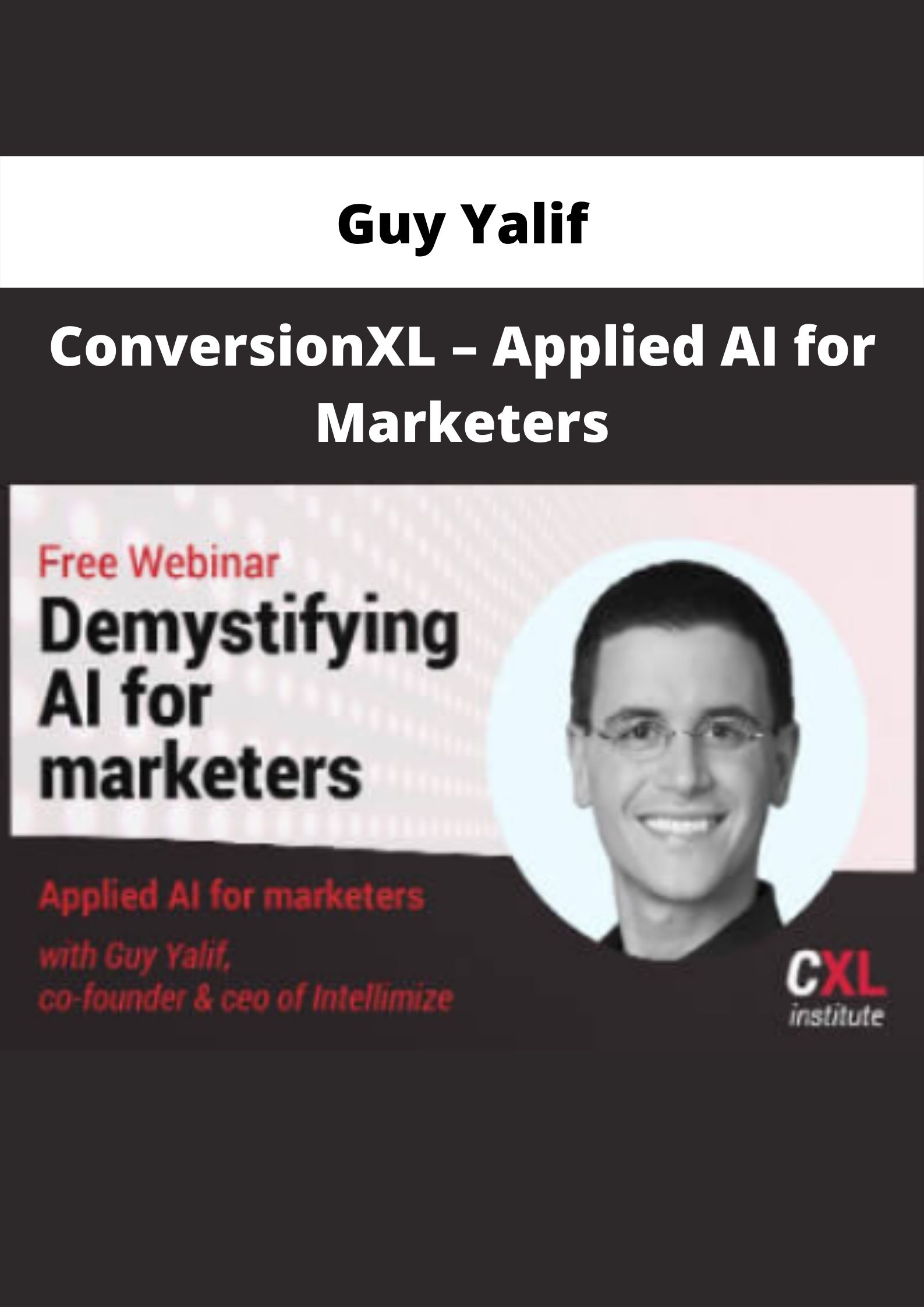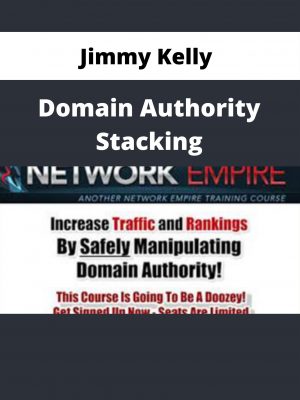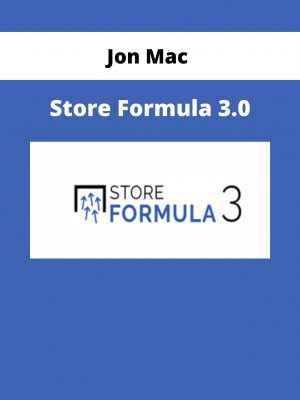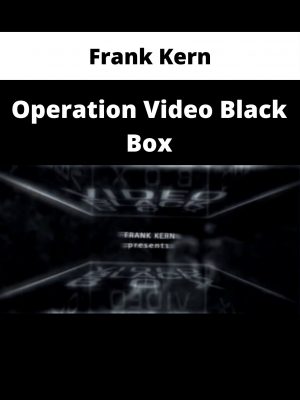ConversionXL – Applied AI for Marketers by (Guy Yalif)
$45
Shopping Instructions:
- DISCOUNT 15% : SHOP15
- Product Delivery: Within 1 – 12 hours after purchase.
ConversionXL – Applied AI for Marketers by (Guy Yalif)
Sale Page : -/-
Description:
UNDERSTAND AND APPLY THE RIGHT AI TECHNOLOGY IN YOUR MARKETING
Artificial Intelligence, or AI, can change your career for the better
What do you really need to know about AI to be an effective conversion rate optimizer? How can AI help you today to drive more revenue for your business?
In this course, we will focus on practical ways you can use AI for CRO and other marketing applications. You will cut through the AI hype and gain a practical, applied understanding of AI. AI won’t feel like a buzzword to you.
In 4 classes, you will be able to answer
- What are the major types of AI and how do they relate to one another?
- Which types of AI are better suited to different kinds of marketing problems?
- How should you and your teammates think differently to get the most out of AI?
- What data is needed to use AI?
- What resources should you deploy to get the most out of AI?
- What are common use cases for AI in B2C and B2B CRO?
After taking this course, you’ll understand AI, and how to evaluate and apply the right AI technology in your work.
This course will teach you
In four sessions, you will cut through the hype and gain a practical, applied understanding of AI. You’ll be able to answer most questions coming from your colleagues about AI and make better choices about your AI related investments. We will focus on CRO use cases and touch lightly on other marketing uses for AI.
We’ll begin with a practical discussion of the major types of AI that matter to us as CROs and how they relate to one another. We’ll talk through examples of different kinds of AI and the kinds of marketing problems they’re well suited to solve. We’ll explore how each of us should think differently, the data that is needed, and the resources you should expect to deploy to get the most out of AI. Finally, we’ll talk through common uses cases for AI in B2C and B2B to drive more conversions.
This course is right for you if…
- You have no previous practical understanding of AI
- You have beginner or intermediate understanding of AI and its use for marketing
- You want to optimize and are wondering how to apply automation to do so
- You’re curious about AI and want to sound credible when your teammates ask about it
- You do not need any technical background to get value from this course
This course is probably not for you if…
- You already have deep experience applying AI to optimization problems. Please wait for the “Advanced Topics in Applied AI for Marketers” course coming January 2019
- You want to learn how to code AI
Skills you should have before taking this course
The course is suitable for everyone, however, it important to note the following:
This course is for marketers with beginner or intermediate understanding of AI, including those with no understanding of AI at all. This course is right for marketers who are not using AI today or have just begun to start using AI.
If you already have a lot of experiencing applying AI to optimization, you should wait for “Advanced Topics in Applied AI for Marketers” coming in January 2019. Neither this course nor “Advanced Topics” is designed for those wanting to learn how to code AI.
About your instructor, Guy Yalif
Co-founder and CEO of Intellimize
Guy Yalif (@gyalif) has been putting AI into the hands of marketers for the past several years as Co-founder and CEO of Intellimize which uses predictive personalization to drive better website conversions.
Most recently, Guy was Vice President of Global Marketing at BrightRoll where he was responsible for end to end marketing from demand generation to brand building. Guy earlier created and led the global product marketing and industry marketing teams at Twitter. Guy also worked at Yahoo in marketing and product management serving advertisers across search, display, video, mobile, and web presence.
Previously, Guy worked at Tradeweave, an online marketplace in retail, and spent time at Microsoft and the Boston Consulting Group. Guy graduated summa cum laude from Princeton University in Mechanical and Aerospace Engineering and was an Arjay Miller Scholar at the Stanford Graduate School of Business.
Your full course curriculum:
Applied AI for Marketers
Lesson 1
The branches of the AI tree
We will open with an overview of AI. We’ll talk through the different types of AI and the kinds of problems they’re best at solving. You will be able to make better choices about which kind of AI to apply to the problems you are trying to solve for your business and you’ll be able to hold a thoughtful business conversation about AI.
Lesson 2
Getting started with AI
After this class, you’ll be able to map the branches of the AI tree to the marketing problems they’re best suited to solve, with a heavier focus on conversion rate optimization. You’ll also understand the data you need to use AI well, the mindset changes needed to get the most out of AI, and how to best pair AI with people to maximize revenue.
Lesson 3
Using AI day to day
In this class you’ll gain a practical understanding of how to run iterative generations of experiments better with AI, how to use A/B testing and AI best together, and how to best setup AI to achieve CRO success.
Lesson 4
Common plays
In this session, we’ll review common plays B2C and B2B marketers run with AI to maximize conversions, how to use AI when A/B testing is new to you, and what you should expect to put into and get out of AI.
Internet Marketing Course
Digital marketing is the component of marketing that utilizes internet and online based digital technologies such as desktop computers,
mobile phones and other digital media and platforms to promote products and services. Its development during the 1990s and 2000s,
changed the way brands and businesses use technology for marketing. As digital platforms became increasingly incorporated into marketing plans and everyday life,
and as people increasingly use digital devices instead of visiting physical shops, digital marketing campaigns have become prevalent,
employing combinations of search engine optimization (SEO), search engine marketing (SEM), content marketing, influencer marketing, content automation,
campaign marketing, data-driven marketing, e-commerce marketing, social media marketing, social media optimization, e-mail direct marketing, display advertising,
e–books, and optical disks and games have become commonplace. Digital marketing extends to non-Internet channels that provide digital media, such as television,
mobile phones (SMS and MMS), callback, and on-hold mobile ring tones. The extension to non-Internet channels differentiates digital marketing from online marketing.
Please kindly contact us if you need proof of item.
1 review for ConversionXL – Applied AI for Marketers by (Guy Yalif)
Add a review Cancel reply
Related products
Internet Marketing
Internet Marketing
Eternal Scale System + OTO – Scale and Sell Over 10,000 Physical Products
Internet Marketing
Internet Marketing
Internet Marketing
Internet Marketing
Greg Davis – Affiliate Millionaires 2017 ( Super Affiliate Rockstar Live + Bonus )
Internet Marketing












Mr. Yesenia Prosacco –
Thank you | ConversionXL – Applied AI for Marketers by (Guy Yalif)